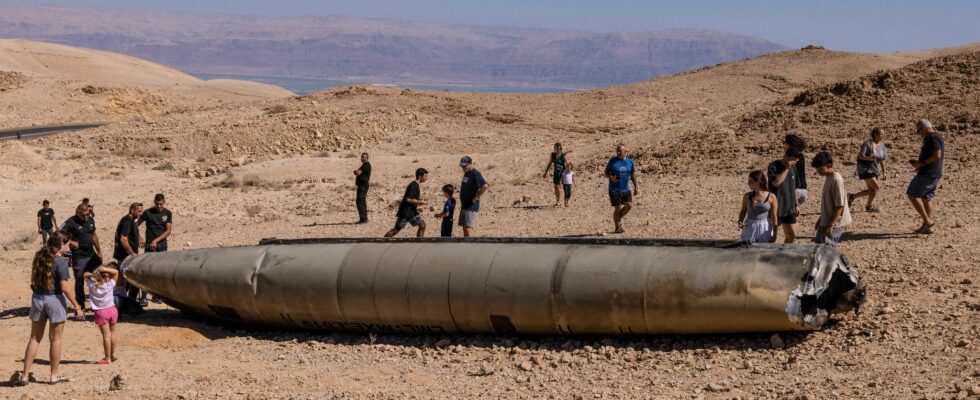“I don’t believe there will be a total war. I think we can avoid it. But there is still a lot to do”, declared Thursday evening, October 3, American President Joe Biden, when the The international community fears a large-scale conflict in the Middle East. The region is in fact suspended from Israel’s response, after Tuesday’s major attack by Iran, involving 200 missiles, which were largely intercepted by the Jewish state and the defense coalition led by the States -United.
Iran described this attack as just revenge after the assassination, attributed to Israel, of Hamas leader Ismail Haniyeh on July 31 in Tehran, and that, claimed by Israel, of Lebanese Hezbollah leader Hassan Nasrallah on July 27. September in Beirut, the Lebanese Islamist movement being largely supported by the mullahs’ regime. An attack that is above all “symbolic”, as analyzed by K. Campbell, veteran of American military intelligence, with AFP: “All air defense systems have a saturation point, and Iran seems to have deliberately remained in below the saturation point of Israeli air defense.
Fear of high intensity conflict
Still, the Iranian attack could have regional consequences. As early as Tuesday evening, Israeli Prime Minister Benjamin Netanyahu warned: “Iran has made a serious mistake […] and will pay the price”. The Israelis “are obliged to retaliate because of the scale of the attack and the fact that there is a change in the nature of the targets” targeted by Iran (in particular Mossad installations ), in relation to the first direct Iranian attack on Israel, last April, analyzes for his part David Khalfa, co-director of the North Africa and Middle East Observatory of the Jean-Jaurès Foundation, with the ‘AFP.
What form could the Israeli response take? Is all-out war between Iran and Israel still avoidable? After months of escalation, the risk of a shift towards a high-intensity conflict which would spill over to other countries in the region, although it gives cold sweats to the international community, is very real for several analysts.
An air attack on nuclear installations?
Especially since the start of the week, several voices in Israel, including members of the government, have spoken of “a historic opportunity for Israel to definitively settle its score with the Iranian regime”, recalls David Khalfa. “Given the circumstances, Israel can consider that the time has come to strike very hard against Iran”, weakened by the hard blows inflicted on its Lebanese ally, Hezbollah, analyzes The Orient-The Day. Former Israeli Prime Minister Naftali Bennett notably called on Wednesday for a decisive strike to destroy Iran’s nuclear facilities, the country being suspected of wanting to acquire a nuclear bomb, until now only possessed in the region by Israel.
A strike against Iranian nuclear facilities, however, would require U.S. support. However, President Joe Biden was very clear on this subject: “The answer is no,” he said on Wednesday. An a priori hypothesis to be ruled out therefore, since, as the analysis Financial Timesthe IDF is incapable of carrying out this operation alone: ”Due to the distance first. More than a thousand kilometers separate Israel from the main Iranian nuclear facilities, and to reach them, Israel would have to cross the airspace of the Saudi Arabia, Jordan, Iraq, Syria and potentially Turkey”, also facing “fuel supply problems”. Finally, “the third obstacle concerns Iranian air defense. The country’s main nuclear sites are very well guarded and Israeli bombers should be protected by fighter planes.”
The option of remote sabotage
At present, only the United States would have the equipment and sufficient military force to carry out such an operation. “A war with Iran would require the political, economic and military support, even the participation of the United States. Israel undoubtedly recognizes that Washington has no interest in engaging in such a conflict”, especially since approach of the American elections, indicates Norman Roule, expert on the region, quoted by the Wall Street Journal.
According to Axiosa US official said that during discussions between the Biden administration and the Israeli government on Tuesday, the United States made it clear that it would support an Israeli response, but that it believed it should be measured.
Remote sabotage of the electricity network, or a cyberattack therefore seem more likely, depending on the Financial Times. “In 2021, a power outage, apparently caused by a planned explosion, hit Natanz’s internal power grid [où se trouve une usine d’enrichissement, au nord d’Ispahan, qui produit des niveaux d’uraniums proches de celui de la bombe atomique, ndlr]. In 2010, the United States and the Jewish state also allegedly attacked Iran’s nuclear program using the Stuxnet computer virus. But such attacks have not succeeded in stopping his work indefinitely,” recalls the economic daily.
The thesis of an attack on oil installations
Among the options, Israeli experts and media are also considering strikes on strategic sites. On Thursday, Joe Biden said he was “in discussions” with Israel on possible attacks on Iran’s oil installations. “Many Israeli officials view Iranian oil facilities as a likely target, but some say targeted assassinations and the destruction of Iranian air defense systems are also possibilities,” Axios continues.
However, an attack on oil installations and the weakening of the balance in the Persian Gulf could increase international pressure against Israel. Whatever the answer, it could in any case prove perilous for Israel, already engaged militarily on several fronts: in the Gaza Strip, where there are still around a hundred hostages, in the occupied West Bank, against the Houthi rebels of Yemen, and finally, in Lebanon, after days of bombings against Hezbollah.
